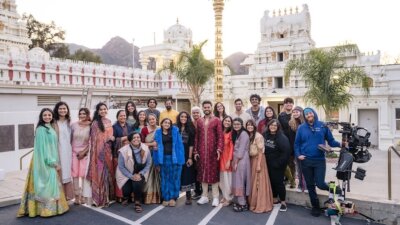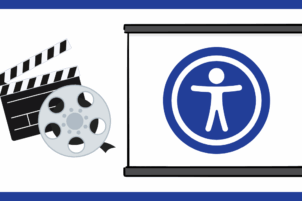 In Sūnna (Hindi for listen), Radha Mehta invites the audience into a contemplative and atmospheric film that recognizes sound and silence as forces that can shape identity and belonging. It follows Lakshmi, a young Indian girl who experiences sudden hearing loss just as she is about to perform a cherished religious song. The film deftly explores identity, familial love, and spiritual belonging.
In Sūnna (Hindi for listen), Radha Mehta invites the audience into a contemplative and atmospheric film that recognizes sound and silence as forces that can shape identity and belonging. It follows Lakshmi, a young Indian girl who experiences sudden hearing loss just as she is about to perform a cherished religious song. The film deftly explores identity, familial love, and spiritual belonging.
“I like to have sound as its own character,” Mehta shared in an interview with Disability Belongs™, “because it’s very much been its own character in my life, throughout my entire life.”
“When that sound escaped me, I felt like I was losing parts of myself,” recalled Mehta, who is hard-of-hearing herself, describing the autobiographical roots of Lakshmi’s story. “Music was all around me, [it was] so entrenched within our home.”
There’s a tenderness that anchors the film, rooted in how disability is portrayed, not as something tragic, but as a part of life that reshapes connection and understanding. Lakshmi’s hearing loss isn’t “fixed” in a neat arc; instead, viewers witness her mother adjusting alongside her, and her own inner world shifting as she explores how to express herself in new ways.
The film also weaves in rich threads of Indian culture, especially through music. Lakshmi’s love for religious singing ties her to her heritage and to her mother, who becomes both her guide and mirror as they walk this new path together.
Mehta reflected on family support in her own journey with hearing loss: “I have my mom to thank. I was quite depressed when I wasn’t able to truly understand music the way I had understood it before or to experience it the way I had before. She was the one that was really instrumental in making me understand vibrations.”
There is something powerful in how the film holds space for spirituality without becoming overly sentimental. It does not flatten Lakshmi’s experience into inspiration or pity. “Yes, you’re losing parts of your identity,” Mehta explained, “but then you’re reclaiming it in a way you would have never imagined.”
“I was born into two religions in our family, Hinduism and Jainism. My mom always sang devotional songs that worked across both of those religions,” Mehta described. “Places of worship are meant to be sacred and a place that we feel safe in, that we could be ourselves, and that’s very much part of our cultural identity.”
Mehta reflected on the dissonance that can surface when familiar forms of connection start to slip away: “I love that interplay, that conflict: this is a safe space that’s rooted within me, but now I feel like it’s slowly escaping me, and does that mean that God is escaping me?”
Rather than offer easy answers, Mehta allows ambiguity and intimacy to lead. She spoke of her ability to “tune in and out of the world” as a kind of luck. “When I had challenges with being hard of hearing, I always said, ‘God, why’d you do this to me?’ Once I finally embraced it and leaned into it, it was actually a beautiful gift.”
The film embodies that perspective with grace, suggesting that silence is not the absence of sound, but a different way of hearing, being, and knowing.
As someone with severe myopia, I found myself thinking of the way I can make the world go soft around the edges simply by taking off my glasses. It’s not the same experience as hearing loss, of course, but it’s a similar ability to shape how much of the world I want to let in at any given moment. Like Mehta, I sometimes find comfort in that muffled distance. It’s a way of tuning out the sensory overload to better tune in to myself.
Lakshmi’s journey in Sūnna is not framed as a tragedy or a problem to be solved. Instead, it unfolds as a quiet transformation, one that holds space for grief, confusion, joy, and agency. Mehta treats hearing loss as a shift in texture, rhythm, and relationality. It’s that framing of silence and sensory difference as something potentially beautiful, even powerful, that makes Sūnna feel so intimate and alive. Mehta’s vision invites viewers to listen beyond sound, to dwell in the places where words fall away.
Mehta is a 2023 alumna of the Disability Belongs™ Entertainment Lab, Los Angeles Cohort, and 2024 Documentary and Unscripted Intensive.








I have seen the film Rabb Di Awaaz, which won the UN India Award 2025— and rightly so. It’s a film that not only entertains in completness, but showcased representation in the most genuine and respectful way but has also been made accessible to all audiences. I’ve seen it screened in hundreds of schools, which speaks volumes about its reach and impact. It’s rare to come across a film that educates, inspires, and includes — all at once. One of the rare gems that India is witnessing for development of Cinema. It is available on YouTube “Rabb Di Awaaz Movie”.